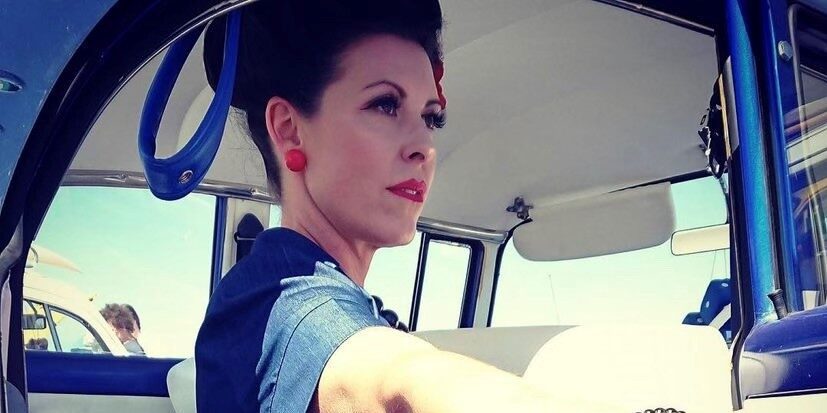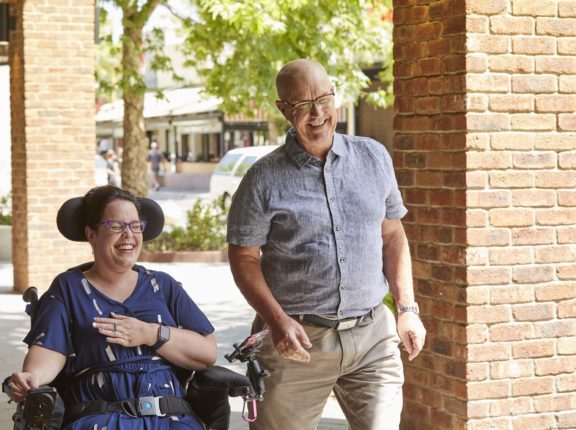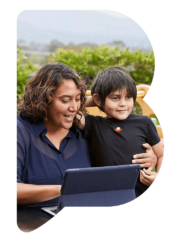Last month we caught up with Anna Waters. Anna lives in Bathurst and is a qualified Horticulturalist who designs and maintains gardens. Anna is also a single parent who cares for her two younger children, Marley (17) and River (8). Both Marley and River have Autism Spectrum Disorder.
The Caring Journey
Anna sensed from early on that Marley saw the world differently, although initially she wasn’t overly concerned.
“I didn’t pay too much attention to start with because children do develop at different rates… Tula’s [Anna’s eldest child] preschool drew my attention to the fact that there were some issues we might need to look at…”
At the age of four, Marley was still nonverbal.
“He was nonverbal, but he did make noises to communicate… it was a bit confronting actually, but, you know, you live in acceptance of your child. I remember taking him to see a psychologist around that time, and for me, that’s when the caring journey really began.”
River was also very young when Anna realised he would need additional help. Although they both have Autism, like any two brothers, Marley and River’s personalities, their likes and dislikes and their individual diagnoses are very different.
“Marley really likes soft inputs – lots of soft fluffy blankets, …he really likes to have quiet time when he gets home, and he likes to stick to his five step instructions. River, on the other hand, has a very different sensory profile. River is a seeker. He likes to crash and bash – and there are big behaviours that go with that, and the way that he expresses his needs. His diagnosis includes Autism Spectrum Disorder, Attention Deficit Hyperactivity Disorder, Oppositional Defiance Disorder, Dyslexia and Dysgraphia, and Auditory Processing Disorder.”
Caring for two boys with Autism has made Anna somewhat of an expert and this was recognised by the Department of Education who offered her work as a classroom Behaviour Support Assistant.
“I stepped into the role, and for about four years I worked as a Literacy Support and Behaviour Support assistant. I loved the work, but I burnt out. Eventually, something had to give, especially as things began to intensify with River…caring for both the boys, not getting enough sleep and working full time…I just couldn’t do it anymore.”
Carer Gateway
When COVID came along, it brought with it fresh challenges for Anna and her family. It was then that Anna reached out to Carer Gateway.
“Tula [Anna’s oldest child] was trying to get through her HSC. I had the three kids at home, and I was at breaking point….”
Tula, who is now attending university in Wollongong, was able to access support with her studies through the Young Carer Program.
“The Young Carer planner with told us about the Young Carer Bursary and encouraged Tula to apply. The bursary allowed her to buy a laptop, which I would never have been able to afford. It also paid for her music tuition, which took a lot of the pressure off.”
Marley, who now helps care for River, was also able access Young Carer supports.
“Marley got to go on the Young Carer Camps and attend some of the Young Carer school holiday activities. I cannot speak too highly of Carer Gateway – it was great for Marley to be able to get out of the house and mix with other young carers.”
And for Anna, Carer Gateway meant a little respite.
“Through Carer Gateway, I was able to access some respite for River during the school holidays. This meant I could go out and work – because if I don’t work, I don’t get paid. The support planner worked tirelessly to help organise that respite …and it was so nice to be Anna for a while, not ‘mum’.”
Best Thing
“The best thing for me has been seeing those boys navigate their world better and better every day.”
Hardest Thing
“The advocacy – having to fight to get the best outcomes for my boys, each day, every day. That’s the hardest thing. No one likes you to rock the boat, but sometimes you have to.”
What Keeps you Going?
“My children. My children have taught me more than I think I’ll ever teach them.”
Hopes and Dreams
“To know that my children are going to be safe, healthy, and happy – what any parent would want. Once you know that your children are happy, that they’re comfortable and supported, well, your role changes. You can relax a little bit because you know you’ve put in the hard yards. You can see them flourish; you can see them shine. And then you can give yourself a bit of a pat on the back and say ‘well – look at us go!”
Top Tip
“Trust your instinct. If you need to rest – rest. If you need to advocate – advocate. If you need to be quiet and still- be quiet and still. And if you need to play – then play.
Time is so precious. Sometimes you can be overwhelmed by it all, but I don’t think the universe, or God, or whatever, has given you these children for no reason. Seeing how far Marley has come …he has introduced me to his world, and I thank him for that. He’s opened my eyes up to a world of empathy and understanding that I wouldn’t have had if it weren’t for him.”
If you’re one of Australia’s 2.7 million unpaid carers, you can access practical advice and support by contacting Carer Gateway on 1800 422 737.
Glossary:
- Autism Spectrum Disorder (ASD) is a lifelong developmental condition characterised by difficulties in social interaction, communication, restricted and repetitive interests and behaviours, and sensory sensitivities.
- Attention Deficit Hyperactivity Disorder (ADHD) is a brain development disorder which can affect a number of areas of brain function, and cause difficulties with inattention, impulsivity, overactivity, emotional regulation, social navigation, and sleep.
- Oppositional Defiant Disorder (ODD) involves a frequently occurring and ongoing pattern of anger, irritability, arguing and defiance towards parents and other authority figures.
- Dyslexia is a learning disorder that causes difficulties with reading due to problems identifying speech sounds and learning how they relate to letters and words (decoding).
- Dysgraphia is a neurological condition and learning difference where an individual has difficulty with writing for their age level. This can range from issues with the physical act of writing to issues with translating thoughts into written words.
- Auditory Processing Disorder (AFP) is a problem with the way an individual’s hearing and brain work together to process (understand) sound.



